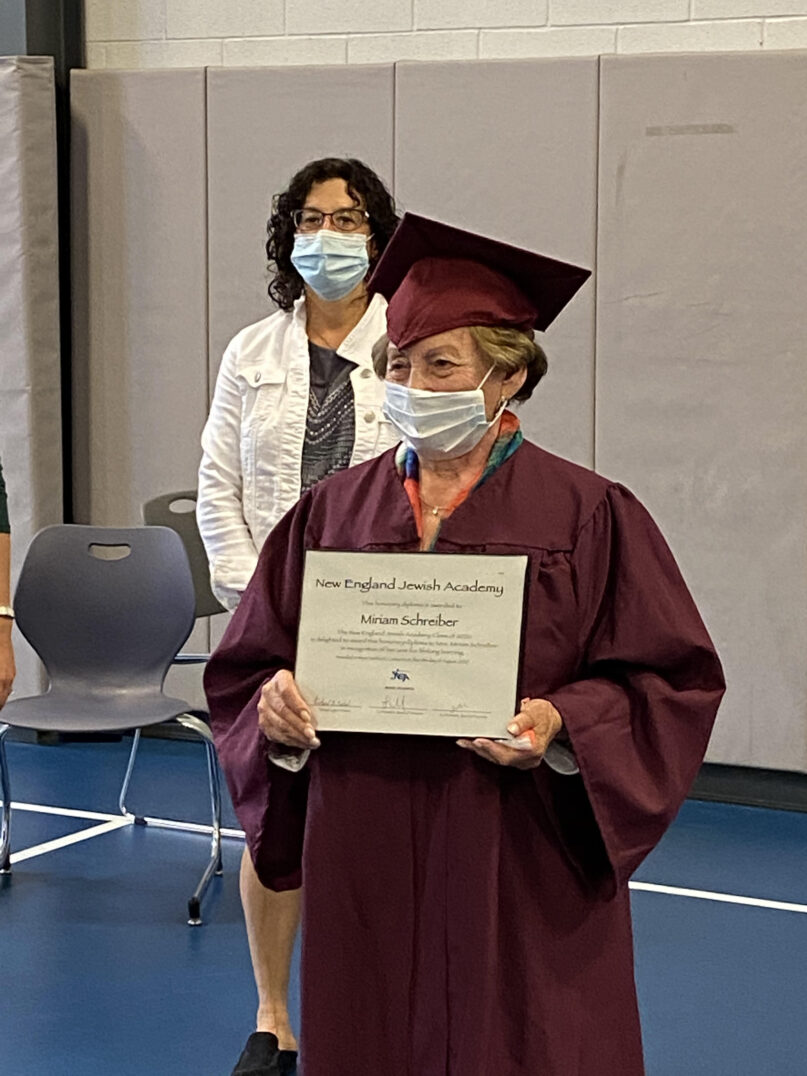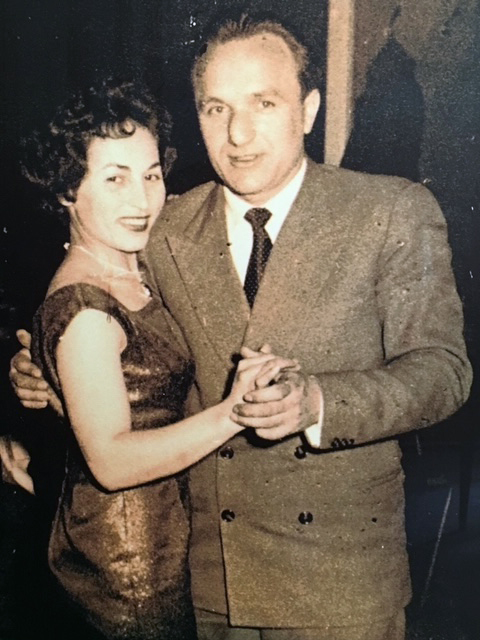
By
Stacey Dresner
WEST HARTFORD — Miriam Schreiber was just six years old when World War II began. When the Nazis invaded, she and her family made their way from their small village of Długosiodło in Poland to Russia seeking safety.
Several of Schreiber’s childhood years were spent in a Siberian work camp, where her older relatives were forced into hard labor, and suffered from freezing cold temperatures and malnutrition.
Not freed from the Russian camp until a year after the war ended, Schreiber and her family made their way to a displaced persons camp in Germany, before her journey took her to several countries, including Israel, and then finally, the United States.

After more than 50 years in West Hartford, where Schreiber, who is now 88, and her late husband Saul raised their two sons, the great-grandmother of three still has one big regret – that she was never able to go to school and did not receive a high school diploma.
“It’s been a real dream of mine for all my life, because I never got a diploma from any school – not from kindergarten, not from grade school and not from high school,” she says. “I have never had reunions; I have never had schoolmates. I have never had the kavod – the honor — to get a diploma.”
Schreiber finally got that kavodon Sunday, August 16 when the New England Jewish Academy (NEJA) presented her with her very own honorary high school diploma.
A small crowd of her family and friends – masks on and socially distanced – gathered for an outdoor ceremony at the West Hartford school to witness NEJA graduate Shoshana Olkin present Schreiber with her honorary diploma on Sunday, August 9. It seemed fitting — after all, it was Schreiber’s conversation with Okin and fellow NEJA senior Moshe Koenigsburg last October that was the impetus for the diploma presentation.
While she had given her testimony to the Fortunoff Video Archives at Yale University, Shreiber had never talked to a group about her experiences. But her son, Bernhard “Bernie” Schreiber of West Hartford encouraged her to open up.
“I had been telling her that her story is important and that she should tell it,” Bernie Schreiber says.
Through Miriam Brander, Jewish Family Service’s state coordinator for the Program for Holocaust Survivors, and JFS social worker Erica Kapiloff, a case manager for Holocaust survivors, NEJA was put in touch with Schreiber.
“We are always looking for opportunities to connect our survivors to the next generation and to help them tell their story,” Brander says. “NEJA also looks for ways for their students to connect and this was a great match. Miriam is one of the most inspiring people I’ve had the opportunity to meet.”
The students, also with NEJA Upper Division principal, Dr. Richard Nabel, and the two JFS professionals, sat down in Schreiber’s home to hear her story.
After escaping the Nazis and making the long hard journey to Russia, Schreiber’s family was detained at the border. When they were allowed in, the Russian army sent them to Siberia.
“My memories are horrible,” Schreiber recalls. “It was hell on earth. We were in a camp…. There was no way out of there. It was cold. We were hungry. It was misery.”
Schreiber was too young to work, but her 12-year-old sister was forced to work with the adults, who cut down trees for lumber, among other kinds of work. Little Miriam sat scared and alone all day in the small log building her family shared with three other families.
“The frost was inside as well as outside,” she recalls. “It was 60 below zero on any given day.”
One day a family member died and they were forced to leave the body outside because it was too frozen to dig. It was assumed that wild animals had dragged the body off into the woods.
In the meantime, her father, who had been in the Polish army at the beginning of the war, tried to get to Russia to find his family, but was then conscripted into the Russian army to fight. At the end of the war, Schreiber’s family was finally freed from the Russian work camp. Her father found hem as they walked along the route back to Poland. But when they arrived back in Długosiodło, the antisemitism was still so strong they had to leave.
Once at the DP camp in Germany, Miriam met Saul Schreiber and they were married. Their son Bernie was born five days after Miriam Schrieber’s 16th birthday. A year later, they made it to Israel where Schreiber’s older sister had settled. Years later, they moved to the U.S.
“Wherever she went she learned a language,” her son Bernie says. “She spoke Yiddish, Polish, fluent Russian; then she went to Israel and she spoke Hebrew, which she still does to her family members there; and German and now English. So she is quite accomplished.”
Shoshana Olkin say Schreiber’s story of survival was inspiring.
“She went through so much and she did not even get to graduate from high school and school meant so much to her,” Olkin say.
It took less than three minutes for NEJA’s senior class to vote unanimously to present Schreiber with a diploma at their 2020 graduation. Due to Covid-19, however, that ceremony was cancelled in favor of a virtual graduation that was held online in June. Schreiber was presented with her diploma at a ceremony attended by family and friends at the school on Sunday, August 16.
Dr. Nadel was so moved by Schreiber’s story, he planned the event himself.
“Every Holocaust survivor has their own unbelievable story and Miriam’s was just so touching, but the tie into education really hit home for the seniors — how fortunate they were to be able to graduate and here was this woman who had lived her whole life not being able to fulfill that basic achievement,” he told the Ledger.
When Olkin called Schreiber to tell her she would be getting a diploma, the older woman was thrilled.
“She was so happy and I just felt so good that this woman who had gone through so much would finally get the diploma she had wanted for so long,” says Olkin. “When Miriam told her story, I felt like I had this connection to her, and I told her that we really look up to her…so it’s a real honor for me.”
Says her son Bernie, “This is one of the best things that has happened to her in such a long time. It’s huge.”
The diploma aside, Schreiber says she is glad she was able to tell her story.
“I want people to understand what we went through — it was an unbelievable horror,” she said. “I want people to stop discriminating and stop thinking that they are better than somebody else. I want people to understand each other a little bit more and be more courteous and loving. You will accomplish a lot more with kindness than with hate.”








 Southern New England Jewish Ledger
Southern New England Jewish Ledger













